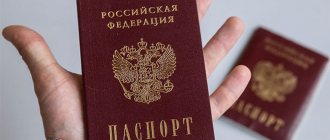For cases where it is planned to subsequently purchase real estate in the name of a child who has not yet reached the age of majority in the privatization procedure, it is necessary to formalize the refusal of the minor child to participate in the privatization of real estate.
Dear readers! Our articles talk about typical ways to resolve legal issues, but each case is unique. If you want to find out how to solve your particular problem, please use the online consultant form on the right or call. It's fast and free!
These types of procedures are quite common and do not require a lot of time.
Can a minor refuse privatization?
All family members who have a residence permit in the residential area have the right to participate in the procedure for re-registration of real estate. Children under the age of majority have the right to refuse to participate in the privatization of housing.
To do this, you must submit an application to the relevant authorities that protect the rights of minors and obtain permission. However, the child does not have the right to refuse in favor of one of the relatives; part of the property, in accordance with the law, is distributed among other participants in equal shares.
Reasons for refusal
To refuse this type of housing acquisition procedure, reasons must be specified.
Most often, a minor refuses to participate in the registration of state property in the following situations:
- planning the acquisition of other real estate and registering it for the child;
- the child’s future departure abroad for study or permanent residence;
- the registered real estate will be sold in the future;
- the child lives with other close relatives and inherits housing, which will be re-registered in his name.
Note! When registering real estate, many parents wonder whether it is necessary to divide housing between children, however, without compelling reasons, in some cases it is problematic to carry out registration with the child’s refusal.
Legislation
The basic legal act that regulates the procedure is Federal Law-1541-1 “On the privatization of the housing stock of the Russian Federation” . The procedure for registering property rights is carried out taking into account the requirements of 218-FZ.
Apartment privatization refers to a free procedure for re-registration of ownership from the state or municipality to citizens. According to the law, all living (namely officially registered) tenants have the right to take part in it.
Until privatization is completed, citizens are considered only tenants under a social tenancy agreement, and not owners.
This limits the rights to dispose of residential premises: citizens do not have the right to sell it, inherit it or give it away.
In order to secure your legal status as an owner, you need to privatize the apartment free of charge.
Despite the fact that the social tenancy agreement is initially drawn up only for one tenant, everyone who is registered there, including minor children, can become owners of the residential premises. Moreover, children are required to participate in the procedure.
Refusal of a minor from privatization
If it is necessary to carry out this type of procedure, it is necessary first of all to collect a package of documents and formalize the abandonment of real estate in the relevant authorities.
Who can cancel?
If a minor has other housing that will be registered in his name, it is enough to write an application and have it signed by the guardianship authorities. Most often, there are no problems in such situations.
In other cases, regardless of the age of the minor, parents submit an application to the guardianship authorities indicating the reasons why the child will not participate in the housing registration process.
Good to know! After a detailed study of the situation, the relevant authorities make a decision on a positive or negative response. The decision of the guardianship authorities will depend on the interests of the minor. If the child’s living conditions improve in the future, it is much easier to obtain this type of document.
Where to contact?
Parents or guardians of the minor must visit the guardianship authorities and obtain permission to carry out such a procedure. After that, you need to contact the notary office with an application and certify its validity.
Procedure
To formalize a child’s refusal to participate in the privatization process, it is necessary to perform the following algorithm of actions:
- parents, even if they are not married, contact the guardianship authorities and submit identification documents;
- submit documents for housing that is subject to the re-registration procedure;
- submit an application for the minor’s refusal to participate in the re-registration procedure;
- receive a response after reviewing the submitted documents;
- visit a notary to confirm the minor’s application to refuse to participate in privatization.
Let's celebrate! Most often, it takes at least 10 working days to review submitted documents. In rare cases, guardianship authorities respond positively only if there are good reasons for this.
Required documents
When submitting an application for registration of a child’s refusal of his share in real estate, the following types of documents must be provided:
- parents' passports;
- housing order or rental agreement;
- technical documents for real estate;
- certificate of all family members registered in the living space;
- child's birth certificate.
Note! When visiting the guardianship authorities for minors, the application is filled out in a special form. If a minor already has rights to another property, it is necessary to submit documents confirming such rights.
Refusal from privatization - a sample
When can you privatize an apartment without a child?
- If the child has never been registered in a municipal apartment, and his parent was discharged before privatization and will not participate in it.
Instructions on how to leave the apartment. When an adult citizen independently checks out of a municipal apartment, he voluntarily renounces the right to live in it and loses it from the moment of checkout. And once a citizen loses the right of residence, his child also loses this right - according to the logic of the above paragraph 2 of Art. 20 Civil Code of the Russian Federation. This is indicated in paragraph 3 of Art. 83 of the Housing Code of the Russian Federation - “If the tenant and members of his family leave for another place of residence, the social rental agreement for residential premises is considered terminated from the date of departure.” Also in Art. 7 of the Law on Privatization dated 04.07.1991 N 1541-1 - “The contract for the transfer of residential premises into ownership includes minors who have the right to use this residential premises and live together with persons to whom this residential premises is transferred into common ownership with minors, or minors, living separately from these persons, but who have not lost the right to use this residential premises.” - If the child has never been registered in a municipal apartment, and his parent was discharged by court decision.
Here it is the same as in the first case, only the parent and child lose the right from the moment the court decision enters into force - Art. 209 and Art. 210 Code of Civil Procedure of the Russian Federation. - If the parent left the apartment before the birth of the child or was discharged by court decision. This is similar to the situations above.
How to privatize a municipal apartment and what documents to collect.
Consequences of a minor’s refusal to privatize an apartment
After the refusal of children to share in real estate, the following consequences are implied:
- a minor citizen has the full right to use property on an indefinite basis;
- in case of sale of real estate, the consent of children is not required;
- in the case of the sale of real estate, a person under 18 years of age is not entitled to a portion of the income received;
- the child has every right to further participate in the housing privatization procedure;
- the share that was due to the minor is divided among the remaining participants.
Let's celebrate! A prerequisite for drawing up this kind of document is the presence of all participants. If one of the parties to the transaction is not present, then it is necessary to provide his written agreement.
⚖️ Judicial practice
In the review of judicial practice of the Supreme Court No. 4 (2020) on administrative cases (paragraph 48 pp. 105-107) there is an interesting definition No. 222-KA20-16-K10, which is very interesting to study.
The following case was considered at the meeting: in accordance with Article 15 of Law No. 76-FZ of May 27, 1998, a serviceman was recognized as in need of housing provided under a social tenancy agreement. His family consists of four people - himself, his wife and two children.
The wife of a serviceman, while still a minor child and being in the family of her father, also a serviceman (this is important!), exercised the right to privatize her parent’s apartment in 1998. As a result, she then received ownership of 1/4 share of the total area of 72.3 m2, which is 18,075 m2.
In February 2005, the wife transferred her share of the living space to her father as a gift. And in 2021, when determining the maximum amount of total housing area provided to a military husband, the housing commission took this fact into account and reduced the size of the area for the family by exactly the same amount (18.075 m2) that was previously privatized by the spouse when she was a minor.
The serviceman did not agree with this decision of the commission and appealed to the Reutov Garrison Military Court. However, first the garrison, then the Moscow district, and then the Cassation military courts supported the decision of the housing commission. And they refused to satisfy the claim.
The Supreme Court, having considered this case, came to the following conclusions:
- The position of the courts was that, according to the Law “On the Status of Military Personnel” No. 76-FZ, military personnel and members of their families can exercise the right to obtain housing only once. Therefore, the courts considered that since the wife already received housing as part of the family of her father, a military man, she lost the right to receive housing as part of the family of her husband, a military man. Therefore, if the housing standard is not reduced by the previously received 18,075 m2, this will lead to an excess supply of housing.
- The courts ignored the fact that the state provides additional housing rights to minors, which they can exercise after reaching adulthood. This, in particular, is directly stated in Article 11 of Law No. 1541-1 “On the privatization of housing stock in the Russian Federation.”
The Supreme Court indicated that minor citizens who became home owners through privatization have the right to re-receive municipal or state housing with its subsequent privatization . In other words, if the soldier’s wife had been an adult at the time of the first privatization, then the conclusions of the military courts would have been fair.
But since she has not reached the age of majority, the courts’ conclusions are unfounded - the woman has the right to re-privatization. And reducing the maximum area of allocated housing is illegal.
Therefore, the decisions of the garrison, Moscow district and cassation military courts were overturned. And the decision of the housing commission was declared illegal.
Possibility of cancellation of refusal
After the privatization of housing, it is quite problematic to challenge the refusal, but in some situations this type of procedure is possible. For minor citizens, it is necessary to submit an application to the guardianship authorities, which will represent the interests of the child.
To cancel a document, it is necessary to file a claim in court for further proceedings.
The claim must state the reason why the refusal should be revoked, these reasons may include:
- the use of coercive measures for children in the process of drawing up a document;
- incorrectly executed privatization agreement;
- children's rights were violated;
- the living conditions of the minor citizen have worsened.
Note! There can be a large number of reasons; after submitting an application to the guardianship authorities, specialists will assess the current situation and advise the minor on further actions. After reviewing the application, the judicial authorities will schedule a hearing. At the hearing, the minor's parents must provide an explanation of the situation.
After considering all the evidence provided by the guardianship authorities and the testimony of the parents, the court makes a decision, very often in favor of the minor child.
After the court's decision, the property is distributed among the participants in equal shares. A positive court decision will depend on the period that has expired after the registration of the refusal; if a person has reached the age of majority, the refusal can be annulled only in cases where violations of the law have occurred and the child was fraudulently deprived of his share in the real estate.
Many parents draw up the document intentionally so that if they need to sell their home, there are no consequences. However, when submitting such a request to the guardianship authorities, in rare cases, specialists provide permission to deprive children of a share in real estate.
Let's celebrate! Before concluding such a refusal, you should first consult with a specialist and evaluate all possible consequences.
Didn't find the answer to your question? Find out how to solve exactly your problem - call right now: +7 (Moscow) +7 (812) 309-53-42 (St. Petersburg) It's fast and free!
Child’s participation in collecting documents
If the child is under 14 years old, his presence is not required anywhere. One of the parents/guardian must do everything for him - collect the necessary documents, sign the privatization agreement and submit it for registration - Art. 28 Civil Code of the Russian Federation. If he is between 14 and 18 years old, he and his parent must collect documents, sign applications and a privatization agreement - Art. 26 Civil Code of the Russian Federation.
If you have questions, you can consult for free. To do this, you can use the form below, the online consultant window and telephone numbers (24 hours a day, seven days a week): 8 Moscow and region; 8 St. Petersburg and region; all regions of the Russian Federation.
Normative base
Privatization is regulated by Law No. 1541-1, which was developed and published back in 1991. This document regulates all the fundamental principles that make it possible to transfer state and municipal real estate into the ownership of citizens. After the procedure, the person privatizing the property is given a full list of rights to dispose of it. Living space can be sold, exchanged, rented, donated, bequeathed, or pledged. In addition to the main legislative act in this area, one should rely on the norms of the Housing Code of the Russian Federation.
Over the years, the law on privatization has undergone changes, but the basic principles of the procedure have remained unchanged:
- All citizens can participate in the procedure, but only once in their life.
- Re-registration of property is free of charge.
Persons who legally reside in social real estate can become participants in the program. Confirmation of this fact is a social rent agreement or a move-in order, if it has not been replaced by an agreement.
FAQ
Question No. 1. Can only one person be involved in privatization? There are four residents living in the apartment, one of them is a minor; it is planned to register the property in his name.
Yes maybe. To do this, you need to obtain a written and notarized refusal of privatization from other people living in the apartment, and only the parents of the minor will be able to carry out the procedure, because they are the legal representatives of his interests.
Question No. 2. Until what year can property be privatized for free?
Previously, free privatization was valid until 2021, then it was extended until 2021. At the moment there is a law signed by President V.V. Putin, according to which privatization on a free basis is recognized as unlimited.
Question No. 3. The apartment was privatized in April 1995, a month later a child born in 1993 was registered in it. Is it possible to challenge the deal now so that he is allocated a share in the property?
No, you can't for several reasons. Firstly, the statute of limitations has expired (10 years from the date of violation of the right, Article 196 of the Civil Code of the Russian Federation), secondly, the property was acquired before the minor’s registration, and now he has no right to it, except for residence, if Registration is still valid at this time.
The transaction could have been challenged if, at the time of its execution, he had already been registered in the living space. Let's look at an example from judicial practice:
Citizen Ignatieva V.M. lived in an apartment with her 15-year-old son and husband. Everyone is registered at the same address. The couple decided to register ownership of the woman individually, bypassing the guardianship authorities. Thus, the interests of the minor were affected. Subsequently, he challenged the deal in court, and the judge’s decision declared it invalid on the basis of lack of permission for guardianship.
Document requirements
Refusal of privatization is an official document , which is drawn up and certified in full compliance with the legal norms of the state. To draw it up, you need to contact a notary at the location of the apartment or in any convenient place.
If a citizen registered in an apartment is in another city, he can issue a refusal at the place of his temporary stay. Registration takes place in person upon presentation of a passport. The citizen writes a statement in which he must indicate the following information:
- Personal data – full name, date of birth, passport details, place of registration.
- Data on living space - type of property and its address.
- Motives for refusing a share.
The document is certified by the signature of the applicant or his authorized representative, if privatization is carried out by proxy (read about privatization through a realtor).
When registering, you must pay a state fee in the amount of 500 to 1000 rubles, and present a receipt to the notary.
The notary certifies the refusal with his own signature. From this moment on, the refusal is an official document and is attached to the package of papers submitted for the procedure.
If a citizen registered in an apartment has previously participated in the privatization of another home , there is no need to draw up a document.
You can find out whether it is possible to privatize a share in an apartment, as well as a room in a dorm or communal apartment, on our website.
PRO new building 7 (499) 703-51-68 (Moscow)
- Decisions of guardianship authorities, if necessary.
- Refusal, with certification from a notary.
- Personal documents of those who became participants in the privatization process.
- Certificates from the passport office with information on residents.
- Extracts from the Unified State Register of Real Estate for the property.
- Passports for the apartment, with technical and cadastral data.
- Documents on the basis of which the housing is used. Usually these are social rental agreements and warrants.
- In the future, notarized refusals can be challenged, but this will be very difficult.
- A person who refuses privatization will not be able to dispose of housing at his own discretion if he has not received the status of owner.
- The need to obtain permission from the guardianship authorities complicates the situation if the applicants are minors.
Right to privatization
Privatization of residential real estate is a process as a result of which a person living in the premises can transfer the object from municipal to private ownership, becoming the full owner of the living space.
The real estate privatization program was developed and launched in 1991 with the goal of giving citizens the opportunity to own square meters, which during the Soviet Union were issued on a lifetime basis. The changed government system has not affected the provision of support to citizens who need improved housing conditions. To this day, certain categories of people are given free social premises in which they can register and live indefinitely. Most often, such apartments are given to low-income people, orphans, after leaving an orphanage or in other cases.
Every citizen of the Russian Federation has the right to privatization, but for its implementation it will be necessary to comply with established standards.
How to dispute
It is possible to refuse privatization; this is the right of any citizen. And the decision to use such a right or not depends on the will of the person. You can challenge the procedure in 2 ways:
- With the help of a notary who prepared the waiver documents;
- Through the court.
Such a point can be challenged only if the court does not recognize the transaction, that is, recognition that it is invalid. Perhaps the person was threatened or intimidated. But in this case, evidence is needed that such coercive methods were used.
In such a situation, it is important to find a competent lawyer specializing in such cases.
You can challenge it in the following cases:
- The person challenging the refusal has registration in the apartment that is the object of the dispute;
- Previously, this citizen was not a participant in any transactions related to privatization;
- At the time when the transaction took place , he had Russian citizenship;
- When you submit an application to the court , you need to know that the statute of limitations is 3 years;
- If the deadline exceeds this value, then it will be incredibly difficult to restore it and the judge must provide evidence about the important reasons for the missed deadline.
Subject to compliance with all existing rules, it is possible to refuse privatization, but only with the participation in the trial of a lawyer who is well versed in this issue.









